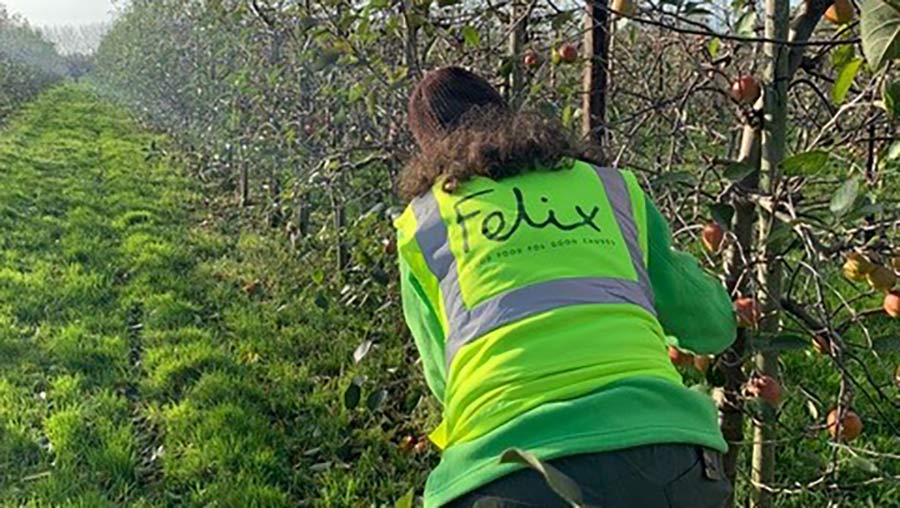Editor’s view: Why the summit was a sedative, not a cure
 © The Felix Project
© The Felix Project On the Farmers Weekly Letters page this week, there is a plea for help from a food charity named The Felix Project (see “Can you donate food to the Felix Project?”).
Charities exist to fill gaps in society, and the chasm they are filling neatly sums up the current problems with our food supply chain.
This laudable organisation wishes to send volunteers to more farms in the South East to pick any ripe crops that are unable to be harvested in order to distribute them to their food bank network.
See also: Rishi Sunak unveils new support package for British farming
What a situation it is when in a modern-day UK large numbers of people can’t afford to buy food from supermarkets, which are themselves offering it at a price too low for there to be a sustainable margin for every segment of the supply chain.
Can you donate food to the Felix Project?
London-based food charity The Felix Project is looking for more farmers to become suppliers.
We know how much effort goes into growing crops and how frustrating it must be to see it wasted, so we would love you to donate it.
In 2022, we reused about 26t of super-fresh, nutritious food from farms across the South East, and gave it to community groups and schools across London that support people experiencing poverty and struggling with the high cost of living.
Sadly, the need for our food is incredibly high. Every single one of the charities we support would like more, and we have more than 600 new organisations asking for our support, but we cannot start supplying them until we get more food in.
We need an extra 50t each week and we are hoping farmers may be able to help.
We will come to your farm at a time that suits you, and our fully insured volunteers will pick any leftover crops.
If you have a farm within a few hours of London and hate to see your crops wasted, please contact us on 0203 034 4350 or email kate.brookes-smith@thefelixproject.org.
Kate Brookes-Smith
Park Royal, London
In February, the Office for National Statistics said a survey of almost 3,000 people showed 10% of adults had often, or sometimes, run out of food and could not afford to buy more in the past month.
One-quarter said they often, or sometimes, could not afford to eat a balanced diet. It’s likely that some of these people will be farmers, who are at the bottom of this malign pyramid of pain.
Yet the government itself feels hamstrung from intervening in a significant way to mitigate the effects of food price rises.
It knows any serious effort to increase the affordability of food will require either significant financial intervention in the food supply chain, or fixing poverty itself.
That is why we are left with the performative politics of this week’s Downing Street garden party, where it was all smiles in the sunshine following the announcement of a few measures that will mildly sedate the pain of the status quo, rather than change the system.
That is not to say the NFU doesn’t deserve some credit for the event. Just look at how busy the prime minister’s schedule is – and the union managed to muscle into it.
On the same day the summit was held he also flew to deliver a speech in Iceland. The next day he departed for a meeting of world leaders in Tokyo.
The power to invigorate the rest of government still resides in Downing Street, and had Mr Sunak chosen to renege on his promise to hold this gathering, it would have sent a clear signal that domestic food production is not a priority.
But this is a low bar while so many clamour for much more transformative actions – so what is the barrier to that?
In 1939, a young John F Kennedy was also puzzling about the failure of British politicians to act in a timely fashion.
Why, he asked in his undergraduate thesis (which later became a bestselling book named Why England Slept), had Britain been so reluctant to rearm itself despite the storm clouds gathering over Europe?
The answer to his problem, ours and many more, is that a democracy requires an argument to be won for progress to happen, and that is extremely tricky when any solution to the problem requires difficult trade-offs.
Politicians in the 1930s channelled the weariness of the people for another conflict and dragged their feet even when they recognised privately how risky that was.
In 2023, we too are reluctant to really grapple with the scale of change required to make The Felix Project unnecessary.
There is no segment of the food supply chain that is happy with the status quo, but none of them have the capacity to make the first move alone.
Only when some aspect of the problem moves from being merely chronic to acute will we see opposition to significant change wash away.
History tells us that will happen if food prices keep rising.

